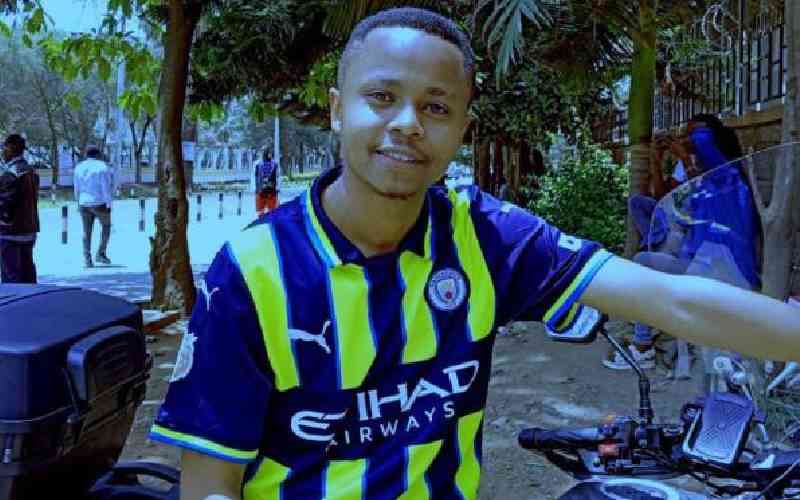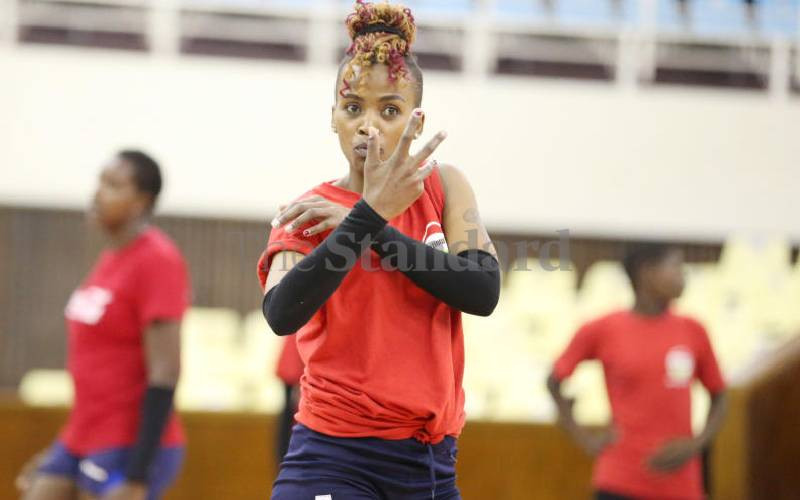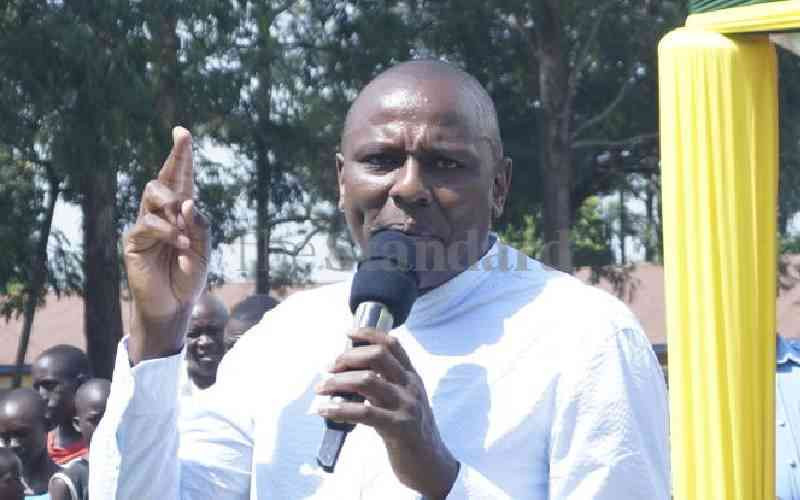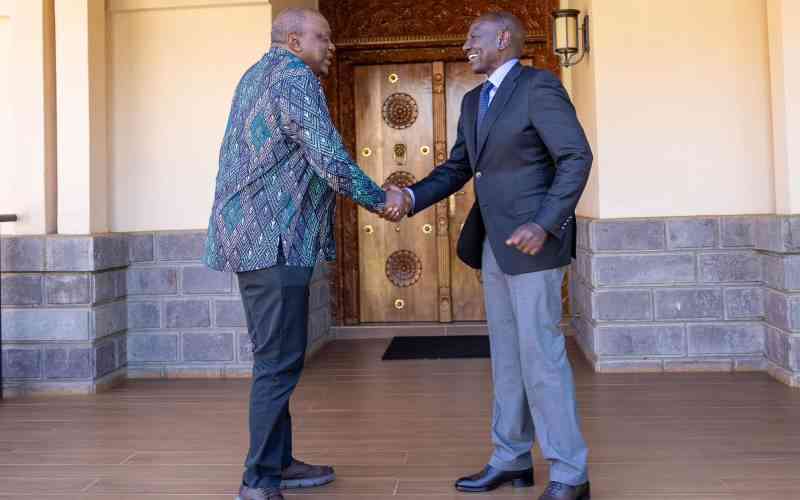Baringo, Kenya: Rael Akeno holds back tears and turns her eyes away from what was to be the grave of her son outside her house in Sesoi in Loruk, Baringo County.
The soil has been replaced in the grave and there is a sign of life in the heart of it. Instead of a cross, a tree has been planted on the mound of soil that would have covered Davis Kemoi Lenengole’s final resting place. The 17-year old is reported to have been mauled by a crocodile on New Year’s eve while fishing in Lake Baringo.
“You cannot live with an open grave, all of the family members will die in succession,” explained Peter Lorenga, a Pokot elder. Planting the tree, he added, helps appease the spirits.
The parents had dug the grave and planned a journey to collect the body at Baringo County Referral Hospital in Kabarnet, only to learn that their son’s body had been disposed of in a public cemetery by the hospital on instructions of the police.
“I need my son to bury or else I will kill myself. No one understands the pain I am in,” mutters inconsolable Akeno amid sobs.
Medical reports and police accounts indicate that the young man was killed by a crocodile.
Yesterday, Kemoi’s father Samwel Lenengole, 47, said police took the body of his son to the mortuary on December, 31 2014, a day after it was found floating on Lake Baringo.
“I was told by hospital officials that the body of my son is not in the mortuary. Who will I bury now?” he asks.
A postmortem report prepared on January 8, 2015 by Dr Paul Odila and obtained by The Standard indicates that Kemoi died as a result of severe crushing inflicted by a bite.
“Severe crush injuries including amputation of lower limbs due to fractures likely to be from a bite,” read part of the report.
Another section of the report, filled by the police indicates that the body was found floating on Lake Baringo.
“The deceased was fishing on the shores of Lake Baringo. The body was found floating on the shores of the said lake with a crocodile near it. The body was partially eaten,” read the report.
Baringo County Kenya Wildlife Service (KWS) Warden Kenneth ole Nashu said his officers were notified on December 31 last year about the body and drove to Lake Baringo. He said they killed a crocodile which was found alongside a male body and handing the body to Loruk OCS.
Curiously, in their report, the police indicate that the deceased was female even as the family insist that this is not the case.
“Kemoi is our first born son. He spends most of his time fishing in Lake Baringo,” said his mother, pointing at a photograph of the deceased.
Stay informed. Subscribe to our newsletter
On January 11, Mr Lenengole also told The Standard that the Officer Commanding Loruk police station, Mr Alex Chepsoi, had asked him to raise Sh11,000 to cater for postmortem, which he did and gave him the money.
Surprisingly, the father claims that neither him nor any member of the family accompanied the police to the postmortem as required by the law.
“I always reminded the OCS not to forget to go with me to the postmortem. But he ignored me saying police will handle everything,” alleged Lenengole.
Nonetheless, Lenengole and another man, Mr Charles Samut, are listed as having witnessed the postmortem.
But when contacted, Samut, who is the chief of Loruk Location, just like Lenengole, denied ever attending the postmortem.
“Those are false allegations. We advised the police to include at least a member of the family during the postmortem but they went ahead and did it without their knowledge. I was also not notified,” said the chief.
This is corroborated by Dr Odila, the pathologist who performed the postmortem who said there were no family witnesses present during the exercise. He said the police who brought the body stood in for the family and later gave a go-ahead to the hospital for the body to be disposed of at the cemetery.
“There were no family witness during the postmortem, it was only doctors and the police,” he said adding, “part one of the report is filled by the police and the second part which is entirely medical is filled by a professional pathologist.”
Unclaimed bodies
The police boss has, however, defended himself against any wrongdoing: “I used the money to pay for the postmortem. I indicated Kemoi as female but this is just a human error which can be corrected. Family members were present during the postmortem,” said the OCS.
Further investigations revealed that the day the OCS received the money from Lenengole was the same day the hospital interred Kemoi’s body at Kabarnet public cemetery.
“We disposed the body at County’s public cemetery on January 11, after the Loruk OCS gave us the nod,” said Dr Kays Muruka, Baringo County Referral Hospital Medical Superintendent.
Muruka defended the medical facility insisting that Kemoi’s body was interred on orders of Chepsoi.
“Procedurally, unclaimed bodies are disposed of after a minimum of 21 days. But this can also vary according to the circumstances surrounding the body. If the police issue orders to that effect, even if it is only few days after death, we go ahead with disposal,” he said.
Baringo North OCPD Gasper Makau, whom Chepsoi reports to, denied ever issuing orders for the disposal.
“I am aware of the incident but I am not aware of any order directing the hospital to dispose the body. If that is true then we need to investigate,” he said.
Dr Muruka said that the hospital’s morgue at the time was overstretched, leaving no room for longer preservation.
“We have a capacity of only nine bodies at a time at the morgue. Considering this challenge, we also saw it wise to dispose the body expeditiously since the police had given us the nod,” he explained.
All these explanations bring little consolation to the mourning Lenengoles, who would like to know what exactly happened to their son and why he was buried in a public cemetery without their involvement.
 The Standard Group Plc is a
multi-media organization with investments in media platforms spanning newspaper
print operations, television, radio broadcasting, digital and online services. The
Standard Group is recognized as a leading multi-media house in Kenya with a key
influence in matters of national and international interest.
The Standard Group Plc is a
multi-media organization with investments in media platforms spanning newspaper
print operations, television, radio broadcasting, digital and online services. The
Standard Group is recognized as a leading multi-media house in Kenya with a key
influence in matters of national and international interest.
 The Standard Group Plc is a
multi-media organization with investments in media platforms spanning newspaper
print operations, television, radio broadcasting, digital and online services. The
Standard Group is recognized as a leading multi-media house in Kenya with a key
influence in matters of national and international interest.
The Standard Group Plc is a
multi-media organization with investments in media platforms spanning newspaper
print operations, television, radio broadcasting, digital and online services. The
Standard Group is recognized as a leading multi-media house in Kenya with a key
influence in matters of national and international interest.








